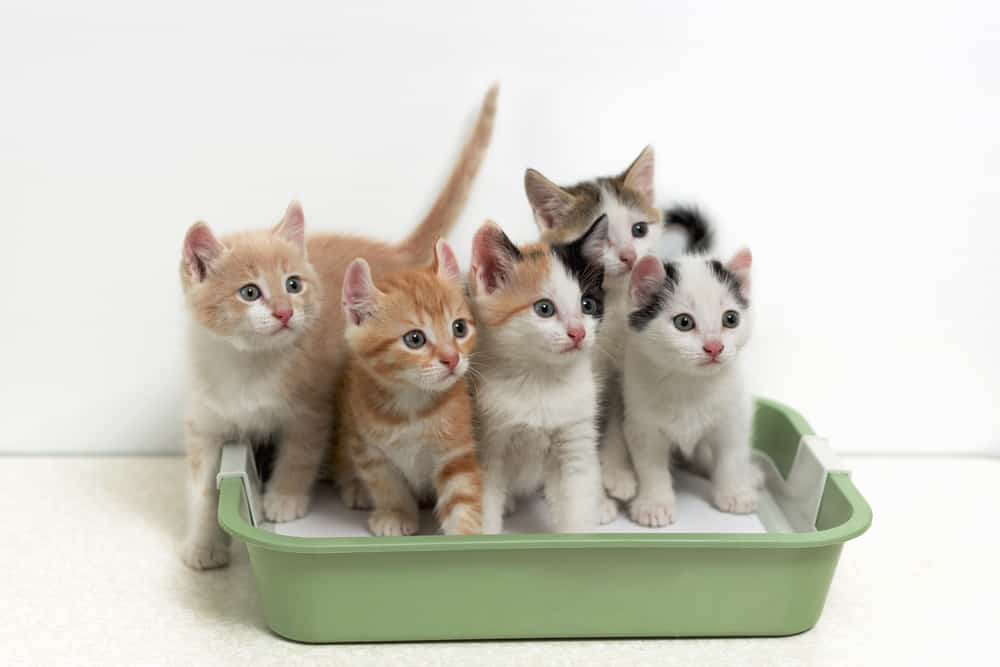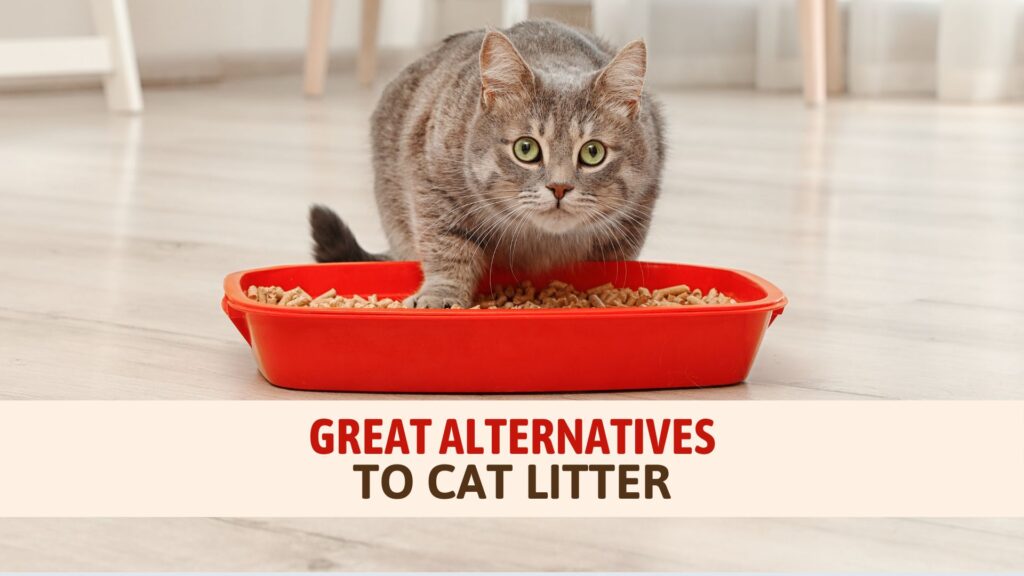Regular scooping isn't so bad, but deep cleaning a litter box and poop scooper can be a bit of a hassle.
Well, more than a hassle, it can be downright gross. But cleaning the litterbox isn't optional and it's an important part of keeping your feline friend healthy and happy.
You'll see all kinds of “hacks” on how to make this process easier but what about just using the dishwasher?
Can you use put a cat litter box or poop scoop in a dishwasher?
Using a dishwasher to clean your litter box isn't a good option for a variety of reasons. Obviously, it's unsanitary to put cat poop in the dishwasher but most litters are also bad for plumbing. Additionally, it may spread toxoplasmosis which is carried in a cat's poop.
And those aren't even the only reasons! Let's take a closer look at why the dishwasher isn't a great option and what you can do instead.
Why The Dishwasher Isn't A Good Option Cleaning Litter Boxes and Poop Scoops
Let's break down each reason why the dishwasher isn't a great spot for the litter box, poop scoop, and anything else that's used in the litter box clean-up process starting with the biggest reason first…
It's Not Sanitary To Clean Litter Boxes In The Dishwasher
First off, I'm not a physician or a veterinarian, so this is not medical advice.
But I also don't think you need to be a doctor to realize that cleaning your dishes and your cat's toilet in the same spot could be problematic! After all, you wouldn't use a scrub brush to clean the toilet and then head on over to wash the dishes, right?
Even if you can't see it, there's fecal matter on almost everything so there's most certainly some cat poop on your cat's litter box- even if you can't see it with the naked eye.
Eating food after your cat has licked it is already a cause for concern but mingling litter boxes, poop scoops, and dinner plates is an entirely different level.
And the issue isn't just about being gross…toxoplasmosis is also a concern.
Toxoplasmosis is a disease that's caused by a single-celled parasite and is one of the most common diseases on the planet. But just because it's common doesn't mean you shouldn't worry about it and even though the risk of complications is low for most people pregnant women or those with compromised immune systems can be especially vulnerable.
Toxoplasmosis is spread by coming into contact with the feces of an infected cat and you may think that the dishwasher will kill off this little parasite but that's actually pretty hard to pull off.
To kill toxoplasmosis from meat, the CDC recommends heating food to at least 145° F (63° C) in most cases and 160° F (71° C) for other cuts of meat. But when you consider that most dishwashers only reach temperatures of about 120° F (48.8 ° C) you can see the problem here. That's just not enough to consistently kill toxoplasmosis.
While some people take a cavalier attitude towards toxoplasmosis, and if your immune system is healthy then there's not much to worry about, I'd prefer to play it safe!
Dishwashers Aren't Built To Sterilize
Not only do dishwashers not get hot enough to sterilize items but if you've run more than a handful of loads through the dishwashers you've certainly had dishes come out with food still on them.
Food is one thing, but when it comes to the litter box we're not talking about food anymore…
Not only could there be cat poop left on the litter box, but some of that feces may end up on other parts of the dishwasher just waiting for the next load.
But it's not the dishwasher's fault!
Most dishwashers, and certainly the ones in your home, aren't made for high-level cleaning and sanitization. Instead, they're just made to make your life a little easier so we shouldn't expect them to tackle the job of sterilizing items with feces on them!
Clay Litter Is Bad For Plumbing
Most litter, but especially clay litter, can clog pipes.
Some cat litter can absorb 15 times its own weight in water which means it doesn't take much to clog a pipe! If you do clog a pipe, be sure to read our review of the best drain cleaners for homeowners.
Depending on your dishwasher, some of the pipes and plumbing that come from the main cleaning area could be much more narrow than plumbing you'd expect on your toilet or other appliance. That means it can be even easier for cat litter to clog these areas.
Other litters, like wood pellets, might be a little better in some ways but worse in others. You can find flushable litter or try to create your own combination but overall most litter isn't even meant to be disposed of in the toilet, let alone the dishwasher!
You can clean off the litter without too much trouble but at that point, it may just make more sense to clean the litter box or poop scoop without the dishwasher at all!
Plastic Litter Boxes Can Melt
If you're using anything besides the smallest litter box tray, you'll probably need to place the litter box on the bottom part of the dishwasher. The bottom tray is also the hottest part of the dishwasher and while it may not be enough to sterilize dishes it's enough to melt or at least warp many plastics.
That's the simplest reason to skip the dishwasher!
Parts Of The Dishwasher Are Porous
As we've already established, dishwashers aren't meant to be used for sterilization, and as a result, many of their components are made of porous plastic.
Compare that to an autoclave which is made almost entirely of metal and designed to sterilize surgical equipment.
The porous nature of a dishwasher may not be an issue when used now and again but over time, especially if the litter box or scooper is quite dirty, it can build up. That may lead to bacteria growth or smell. But it's also just a little gross which should be enough for most folks!
It's Not Environmentally Friendly
Using the dishwasher to wash a litter box is environmentally unfriendly in more than one way.
First, you most certainly aren't going to want to wash dishes along with the litter box or poop scoop so that means the entire dishwashing cycle is dedicated to one or two items. While modern dishwashers are much more efficient in terms of water usage, you can still expect them to use as much as 3 gallons in a cycle.
That's a lot of water just to clean a small litter box and if your dishwasher is even a few years old then it's likely much more than 3 gallons. Of course, if you're washing multiple litter boxes for multiple cats it could be a little better…
But it's not just about water usage!
We've already talked about how toxoplasmosis can spread to humans from cat poop but if cat feces is exposed to the water supply it can be harmful to wildlife as well. After all, that water has to go somewhere and after it leaves your dishwasher it can end up in rivers, lakes, and oceans.
One study found that otters off the coast of California were dying of toxoplasmosis and cat owners flushing cat poops was found to be the cause!
What's The Best Alternative To The Dishwasher?
There's really nothing that's good about the dishwasher approach…so what's a better choice?
Your best option is to use a litter box liner to try and reduce the amount of cleaning that has to be done in the first place. While using disposable products can feel less environmentally friendly, the trash is ultimately the best place for litter and a liner makes the process easier.
If you want to go the liner route, I recommend these liners from Jonny Cat which you can see on Amazon. Even though the packaging looks straight out of the '80s these liners are the real deal and can handle a ton of weight because the last thing you want is to have your cat litter liner break at the wrong time.
They also have more than 11,000 five-star reviews backing them up on Amazon so it's hard to go wrong here.
There are also a handful of other techniques you can use to prevent litter from sticking to the box including adding baking soda and changing your litter but liners will likely make the biggest impact.
Once you've handled most of the dirt with a liner or minimized the amount of caked-on litter, cleaning with dish soap and paper towels is much easier.
Closing Thoughts
You know cats love a clean box and they'll usually find some way to let you know if they're not happy with it. Naturally, supercharging your cleaning with the dishwasher seems like a great option for you and your feline friend but from sanitary concerns to plumbing problems, there are just too many issues with this approach.
Instead, a litter box liner could be a major help but at the end of the day cleaning your litter boxes and poop scoops the old-fashioned way is the best approach!
Read Next:
• Can You Put Essential Oils In The Litter Box?
• Can You Put A Litter Box In The Kitchen?





